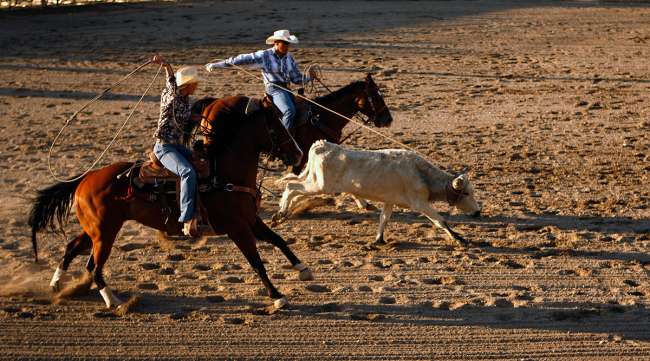Montana Rodeo Cowboys Worried They’ll Need Commercial Driver Licenses Under New Regulations

Montana cowboys are asking Congress to tap the brakes on federal horse trailer regulations they say could all but shut down participation in rodeos.
The Federal Motor Carrier Safety Administration requires commercial driver’s licenses of anyone driving a truck and horse trailer with a combined gross weight of 26,000 pounds — if the trip involves compensation. That last part, about compensation, has rodeo competitors in an uproar because rodeos typically offer prize money.
“For the most part, around Montana, I would say rodeo is a hobby for most people. If you win over $600 you get a 1099 from the rodeo organizer, but for the most part it’s a wash,” said Andy Bolich, Montana State University rodeo coach. “There’s maybe a couple people making money.”
Bolich’s student athletes usually compete at jackpot rodeos, the kind where each competitor chips in $80 or $90 and half goes to prize money. Rarely do these college kids have commercial driver’s licenses, and the incentive to get one isn’t there, the coach said.
Rodeo and equestrian competitors want exemption from the rule. They’re asking members of the U.S. House of Representatives, particularly rural district lawmakers, to apply the reins to regulators.
“As I’ve been traveling around the state, I’ve been approached by a whole bunch of people. There’s just a bunch of concern about this CDL requirement for moms taking horses to rodeo events,” said Rep. Greg Gianforte, (R-Montana). “This ought to be something that should be pretty easy for the Department of Transportation to clarify.”
Twenty-seven representatives, including Gianforte and fellow Republicans Liz Cheney, of Wyoming; and Kristi Noem, of South Dakota; have asked DOT’s Federal Motor Carrier Safety Administration to clarify that a recreational exemption for horse trailers still applies when the trip involves an event with prize money.
There’s money for the economy in equine events, too, said the American Horse Council Foundation. The foundation reports that nearly 4 million horses are used in recreation events and $39 billion is spent in the process.
It would be better if the Federal Motor Carrier Safety Administration also increased the combined gross vehicle weight to 30,000 pounds, said Buster Brown, of Whitlash. An old rodeo cowboy whose family still competes, Brown said the federal government’s 26,000 gross vehicle weight standard is outdated.
Trucks are bigger than they were when the 26,000-pound rule was set several years ago, and so are the trailers, which now include living quarters, in addition to room for two to six horses.
“You take your average one-ton dually pickup, your trailer and I know we’re right there at 26,000 pounds,” Brown said. “You have a four-horse trailer with 8 feet of living quarters. That’s four horses, plus 40 gallons of water, plus four bales of hay. A lot of time, we’re packing another 10 gallons of water just for the horses, too.”
Brown has a simple plan for dealing with law enforcement should he be stopped weighted down and headed to the rodeo. He keeps his attorney’s business card in the cab of his truck.
“First thing I’m going to do is hand them my lawyer’s business card when I get pulled over,” Brown said. “I’ll say ‘here you go. Talk to this guy.’ Someone is going to take this thing to court.”
Buster and his wife, Helen, raise quarter horses and cattle in the Sweet Grass Hills of north-central Montana. Commercial driver’s licenses for rodeo travel aren’t their only challenges with the Department of Transportation.
Late last year, the Federal Motor Carrier Safety administration began requiring all truck drivers to use electronic logging devices to make sure they’re pulling off the road after 11 hours and not returning to driving for at least 10 more.
Livestock haulers cried foul at the new rule and won a 90-day deferment, while other truckers started complying Dec. 18. The livestock haulers said it was inhumane to leave animals in a parked trailer for 10 hours so a trucker can rest up. Better to continue driving until the animals can be unloaded at a final destination, the haulers said.
The meter runs out on the 90-day deferment in a few weeks.
Gianforte said there’s still work to do on electronic logging devices. Often regulations are written by people in urban environments who need to be reminded about the realities of rural life, he said.
Distributed by Tribune Content Agency, LLC




